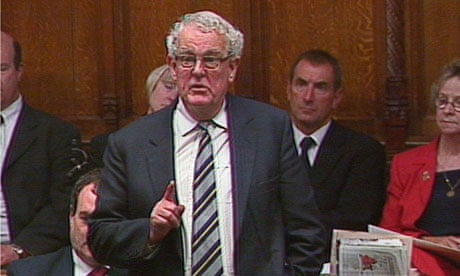What is the West Lothian question?
Most simply put, it asks why Scottish, Welsh or indeed Northern Irish MPs have the same right to vote at Westminster as any English MP now that large areas of policy are devolved to national parliaments and assemblies in areas such as health, housing, schools and policing.
Often translated as "English votes for English laws", the question also comes up if non-English MPs become UK ministers and push through controversial England-only measures, even as their devolved government rejects them.
The question itself is famously attributed to the then Labour MP for West Lothian, Tam Dalyell, who raised it in 1977 when Jim Callaghan's Labour government proposed a devolved assembly in Edinburgh. An anti-devolutionist, Dalyell argued it would be unfair for Scottish MPs to have equal rights to vote on English-only legislation. Callaghan's plan failed to win a large enough Scottish majority in a referendum, and collapsed.
Has it ever really mattered?
When Scotland and Wales won devolution in 1999, English Tory MPs were aggrieved that Labour could – until its defeat at the 2010 election – rely on scores of Scottish and Welsh MPs to push through unpopular England-only measures at Westminster.
It rarely mattered, since Labour's majority in England was usually large enough. There were two incidents when loyal Scottish and Welsh Labour MPs were needed to vote through Labour government policies because so many of their English colleagues rebelled.
In a vote to set up foundation trusts in the English NHS, Blair's majority was cut to 35 because many English Labour MPs rebelled or failed to vote; Blair needed 67 Scottish and Welsh MPs to push the trusts through. Blair needed similar levels of loyalty in January 2004 to introduce tuition fees, a policy firmly rejected in Scotland.
And when John Reid, then MP for Hamilton and North Bellshill, was appointed Blair's health secretary in 2003 when Holyrood had control over nearly all health policy in Scotland, Iain Duncan Smith called it a "democratic monstrosity". But at the time, the Tories had English MPs sitting as shadow Scottish and Welsh secretaries because they had so few MPs there.
What is the answer to the question?
That is the most troubling issue. It is often very difficult to make a clear-cut decision on whether any measure is wholly English since many bills have a financial impact on the UK as a whole, often affecting Treasury grants for the devolved nations. And different devolved governments have power over different policy areas: Holyrood controls fisheries patrols and policing; Cardiff Bay does not.
Short of a federal UK or an elected second chamber, the political scientists Guy Lodge, Meg Russell and Oonagh Gay describe it as a "question without answer".
The hardline response is to ban non-English MPs from voting on any measure which relates only to England. The UK justice secretary Kenneth Clarke's democracy taskforce proposed allowing only English MPs to sit at the committee stage of an English-only bill until a final vote, when it would return to the full Commons. Sir Malcolm Rifkind, a former Scottish secretary and Edinburgh MP and now Tory MP for Kensington and Chelsea, proposed an English grand committee with similar powers.
What do critics of the West Lothian question say?
They argue that making second-class MPs would undermine the entire purpose of the universal franchise: that everyone's vote is equal. It damages the principle of collective responsibility too: why should a talented Scottish MP not run a UK department?
MPs regularly vote on policies which affect other constituencies and not theirs. They also vote on going to war in a country they don't represent or spending money in countries they never visit. And the Tories only complained because they were losing out, some say.
But one of the most politically charged issues is whether downgrading Scottish, Welsh and Northern Irish MPs plays into the hands of nationalists who want to show that Westminster is hostile and England-dominated. The Commons is, after all, the institution which most binds the UK into one. This, in part, is why no one has really wanted to answer the question.
